
The Hate U Give is a very powerful film. It is the kind of narrative that will shake you. Or at least it should. We all can learn from Starr Carter’s (Amandla Stenberg) experience. No matter what walk of life you are from, The Hate U Give teaches a valuable lesson on how we all, as human beings, can always strive to be more understanding, accepting and compassionate. Sadly, society is quick to judge. Too many people act first and ask for forgiveness later when it is often too late. Through Starr’s journey, we come to see how words can be just as piercing as bullets.
Her story begins with a memory of “the talk.” Not the one about the birds and the bees. This discussion is about a different kind of precaution. Starr’s father, Maverick (Russell Hornsby), sits his little ones down and instructs them on how to behave if they are ever pulled over by the police. Make sure to keep your hands visible at all times and calmly comply with the officers’ requests. This extremely important lesson saves her life years later.
As she reflects on her memories of this life-changing moment, Starr explains Tupac’s titular message, which inspired the young adult novel by Angie Thomas: “Pac said Thug Life stood for “The Hate U Give Little Infants F***s Everybody. T-H-U-G-L-I-F-E. Meaning what society gives us as youth, it bites them in the a*s when we wild out. Get it?”
Maverick regrets his mistakes. He got caught up with the local gang, fell into the “Thug Life” and even did time for King (Anthony Mackie), feared leader of the King Lords. In exchange for taking the fall for his so-called friend, Maverick was released from the gang. Now he’s the proud owner of a grocery store in Garden Heights and tries setting a good example for his children. He and his wife, Lisa (Regina Hall), send them to a private school, Williamson Prep, hoping to ensure their safety. As a result, Starr lives as two versions of herself.

“…keeps a low profile, watches the way she speaks and tries to blend in with the judgemental white kids.”
The Williamson Starr keeps a low profile, watches the way she speaks and tries her hardest to blend in with the judgemental white kids. She has a white boyfriend named Chris (K.J. Apa), he’s the kind of adorkable, yet “cool” nice guy who makes her heart melt. On the weekends, she’s the Garden Heights Starr who goes to house parties and doesn’t have to worry about “sounding too black” among her friends. But she still has to be on guard because you never know when the King Lords are up to trouble. It is at one of these parties when Starr’s life takes a turn.
Khalil (Algee Smith) and Starr have been friends forever, and this is the first time they’ve seen each other in a while. When shots are fired at the party, he helps her out of harm’s way and drives her home. On their way to safety, Khalil faces unexpected danger when a white cop pulls him over for no good reason. Starr immediately does as her father taught her and instructs Khalil to do the same. Despite her pleas, he disobeys the cop’s orders to remain still and reaches into the car to grab his hairbrush. The cop thinks Khalil has a gun and fires multiple shots. Starr watches her friend die, while the cop calls in the shooting. He doesn’t even ask for an ambulance.
The scene is appalling, intense, heartbreaking, and infuriating. It is easy for society to become desensitized to images of violence and prejudice. People shrug off another headline, not thinking about all of the lives that are impacted by catastrophic and preventable events. George Tillman Jr.’s direction intimately draws us into the story and reflects all perspectives. We are given insight into the aftermath of such events. Those who have no idea what it is like are shown what happens when the news cameras are not rolling. We witness the unbearable toll it takes on Starr and her community.
Starr’s worlds crash in a horrifying collision as Khalil is vilified by the media and police department. He’s depicted as a gangster who ran drugs for King, and people assume the worst about him, rather than searching for the truth. At school, she sees her peers make a mockery of his death by using a Black Lives Matter protest as an excuse to have a day off from classes. She is repulsed by their behavior but keeps her traumatic experience a secret for fear of the repercussions. In Garden Heights, she is encouraged to speak up in Khalil’s defense. However, doing so also means she would expose King’s detrimental dealings, and he sends unnervingly clear messages on how he feels about that.

“…the way all the perspectives are represented. We see the good, the bad and the in-between.”
We watch in awe as this young woman struggles to find her voice. She weighs the possible consequences of her decisions. A stand-out conversation with her uncle Carlos (Common), a cop, brings haunting realities to light. He admits that cops are trained to take certain presumptive precautions. Although he hates that it is the case, a white guy in a suit would not elicit the same reaction if he reached into his car. It sucks, but that is just the way it is. Well, that is not right, so Starr chooses to do something about it.
What really makes this film effective is the way all the perspectives are represented. We see the good, the bad and the in-between. Yes, there are some stereotypical representations, but those are also based on harsh truths. Some of Starr’s classmates are disgustingly ignorant racists, while others are true friends who love her for who she is. We’re used to seeing Mackie as the lovable good guy, but his portrayal of King is brutal in this film. He perpetuates THUG LIFE at its worst. He goes to unthinkably cruel lengths to protect himself and has lost sight of all empathy. Hornsby tugs on our heartstrings as Maverick. He shows what it means to be a good man and how it is possible to break away from the cycle of hate. Although it is easy to get pulled back into it too.
Stenberg’s Starr is the superstar of this film. Maverick consistently tells Starr to shine her light. She is a force for good and can rise above the hate. Stenberg shines and then some. She fearlessly carries this heavy film. Every tear, laugh and line effortlessly exudes so much meaning.
This phenomenal ensemble brilliantly and tactfully tells a story that our society desperately needs to hear during these trying times. We can work together to break the cycle of hatred and ignorance. It is not too late to change. Hopefully, The Hate U Give will spark conversations around the country and inspire compassion in those who are still set in their unfortunate and intolerable ways.

The Hate U Give (2018) Written by Audrey Wells (screenplay by), Angie Thomas (based upon the novel by). Directed by George Tillman Jr. Starring Amandla Stenberg, Regina Hall, Russell Hornsby, Common, Anthony Mackie, Issa Rae, Algee Smith, Sabrina Carpenter, K.J. Apa, Lamar Johnson, and TJ Wright. The Hate U Give screened at the 2018 Mill Valley Film Festival.
9.5 out of 10 stars


[…] This review was originally published on Film Threat. […]